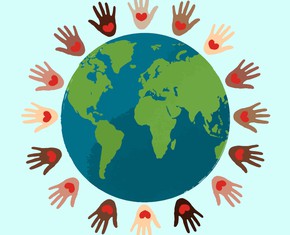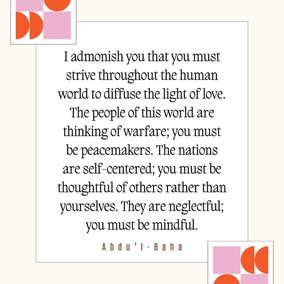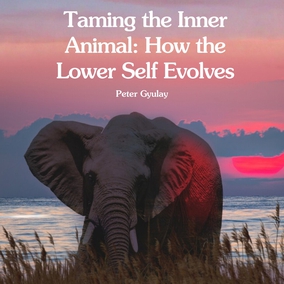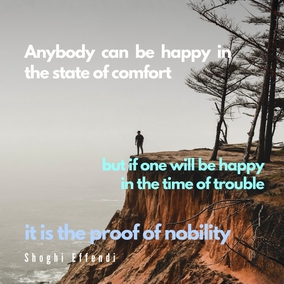The views expressed in our content reflect individual perspectives and do not represent the authoritative views of the Baha'i Faith.
Like most small children I felt very excited by the prospect of beginning school. I breezed through my early reading with a sense of high anticipation.
One of the highlights of this new school year was that we were to set aside our lead pencils and erasers and learn the mysteries of writing in pen and ink. Back in those “olden days” ballpoints were uncommon and frowned upon by any serious teacher—all students had to learn proper penmanship, which meant mastering the mysteries of the fountain pen.
However, on that very first occasion, as I dipped my pen into the bottle of ink and began to carefully form my first letter, I was shocked to see that the ink had smudged. I tried again, this time with more care. To my horror the same thing happened. In growing desperation I painstakingly began to form the shape of the next, only to realize that the letters were even more badly smudged. At this point our teacher swooped down and seized upon my miserable efforts and proceeded to march around the room parading my sad page before her. Everyone’s eyes turned towards me.
Then, to my relief, it turned out that I was not alone. A fellow pupil, a boy I’d never previously noticed, was now also hanging his head in shame and humiliation. The cause of our failure gradually became apparent—we were both left-handed. As our hands moved across the page from left to right, they dragged across the freshly-inked letters, causing them to smudge.
Our teacher Mrs. Wright (not her real name) eventually made the connection between our poor writing and the fact that we were the only left-handers in the class, and promptly decided to remedy this shameful state of affairs by tying up our left hands during future lessons. When, time after time, we failed to form appropriate shapes, we were made to stand on our chairs so that the other pupils could have a good look at what shameful spectacles we really were.
The next class project was puppet-making. I loved arts, crafts and drama, so industriously spent weeks making my puppet, and learning the script for our forthcoming show. But my hopes were shattered when subsequent smudged writing resulted in Carl and I being banished from the room of the puppet production, to sit alone in a cloakroom with dripping rain coats pattering upon our heads. At that moment I understood the misery of Cinderella, sitting alone amongst the cinders whilst her ugly sisters attended the ball. At least she could look forward to Prince Charming, whilst I would have only Carl Newman for company.
For the rest of that year Carl and I were tormented by this teacher. After an anxious summer holiday, at the start of the new year I fortuitously developed what our family doctor proclaimed to my mother was our nation’s youngest-ever-recorded case of shingles—which conveniently prevented me from attending school for many weeks.
In later years I would look back at this time and wonder about Mrs. Wright and her prejudice towards left-handers. I also came to learn more about the history of “my people;” that to be left-handed is defined as being sinistral, a term that gained its origins from the Latin “sinister,” and means “threatening harm, evil, or misfortune.” Other synonyms include ominous, portentous, wicked, unfavorable, unfortunate, or dishonest. Did Mrs. Wright truly believe in the shame of left-handedness, or was she only concerned about the state of her pupil’s handwriting?
Whatever the case, at the end of the year she recommended that Carl and I be placed in the lowest class for the following year from where, only a few weeks into the new term, my new teacher recommended my transfer back to the top class where I arrived in fear and trepidation. In this way, I learned how prejudice affects not just self esteem but far greater aspects such as health, social attitudes, educational and even future employment opportunities.
Truth is stranger than fiction: a decade after this event, I began my first year as a trained teacher. The school to which I was assigned was, by some unseen wisdom, the same school I had attended as a child. Mrs. Wright was still there, in the same room. I came to know her quite well in the course of that year. She seemed diminished somehow. I could look across at her in the staff room and wonder whether she now had any idea of the enduring effects her treatment had on Carl and me.
At that point, teacher-training had given me the opportunity to review that period of my school life with the benefit of a sound understanding of effective teaching practice, of acceptable methods of training children that were not cruel and demeaning. Only providence knew what she had experienced in her own lifetime, what life events may have shaped who she was today; only providence knew her deeper motives. I increasingly came to believe that Mrs. Wright was not some monster, but just a very poorly-trained and closed-minded teacher who was content to operate from a position of unchallenged ignorance, one who never felt the need to call the effectiveness of her teaching to account and consequently remained unaware of her shamefully inadequate and damaging methods. This quote from the Baha’i teachings helped me understand:
The root cause of wrongdoing is ignorance, and we must therefore hold fast to the tools of perception and knowledge. Good character must be taught. Light must be spread afar, so that, in the school of humanity, all may acquire the heavenly characteristics of the spirit, and see for themselves beyond any doubt that there is no fiercer hell, no more fiery abyss, than to possess a character that is evil and unsound; no more darksome pit nor loathsome torment than to show forth qualities which deserve to be condemned. – Abdu’l-Baha, Selections from the Writings of Abdu’l-Baha, p. 111.
What I had previously experienced from Mrs. Wright as prejudice towards left-handers I now recognized in a different light. I realized that it stemmed, not from some calculated sense of malice or other ill motive on her part, but from sheer ignorance. Although that ignorance had had a profound effect on me, she remained completely oblivious to the damage she had caused. Over time I realized that, although I had failed to learn anything much from her about handwriting, I had received other much more valuable lessons; lessons about how we each form private ideas about what is “normal” or acceptable, lessons about how prejudice develops, lessons about the subtle yet enduring effect that it has upon its victims.
The greatest, most enduring lesson that Mrs. Wright taught me was empathy for the victims of oppression. Although my own experience had been at the lowest and least egregious end of the scale, nonetheless as a consequence I had some sense of what others felt.
How often we find that the prejudice which lives in the hearts of human beings, blighting people’s lives and spreading poison across whole societies, stems only from a condition of sheer ignorance deep in the hearts of individuals who know not what they are doing; people who are blind to the effects and implications of their immature belief systems and erroneous knowledge bases:
… the breeding ground of all these tragedies is prejudice: prejudice of race and nation, of religion, of political opinion; and the root cause of prejudice is blind imitation of the past—imitation in religion, in racial attitudes, in national bias, in politics. So long as this aping of the past persisteth, just so long will the foundations of the social order be blown to the four winds, just so long will humanity be continually exposed to direst peril. – Ibid., p. 202.
Now I could see for myself that, embedded deep within every experience of hardship, bigotry and challenge such as mine, lies a precious opportunity to use that life experience to grow in self-knowledge, to pass it on to others and, in so doing, to become part of the solution.
You May Also Like
Comments

















When we are in earnest in our search for anything we look for it everywhere. This principle we must carry out in our search for truth."
~ 'Abdu'l-Baha, Paris Talks. Re your comment about ignorance v malice, only God knows what is in the individual's heart, but if Baha'u'llah states that the ...root cause is ignorance, that's clear enough to me.